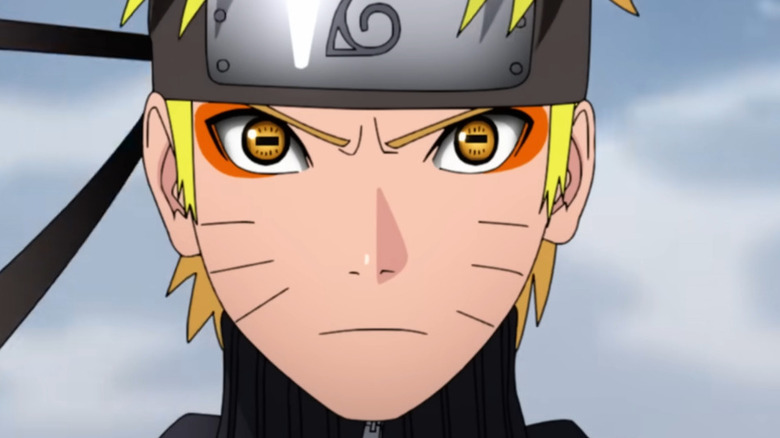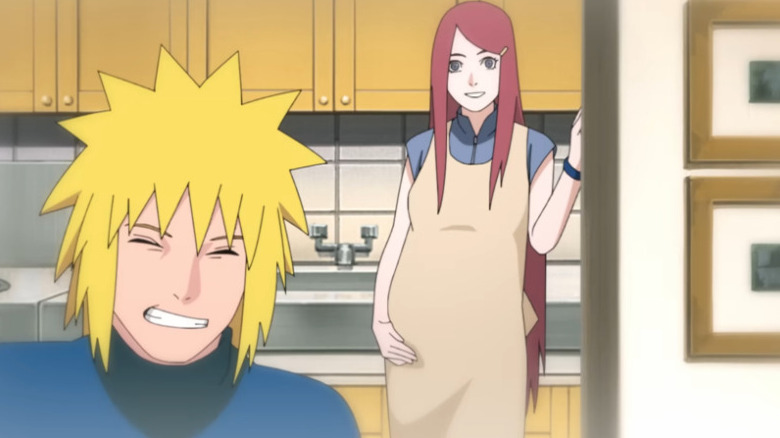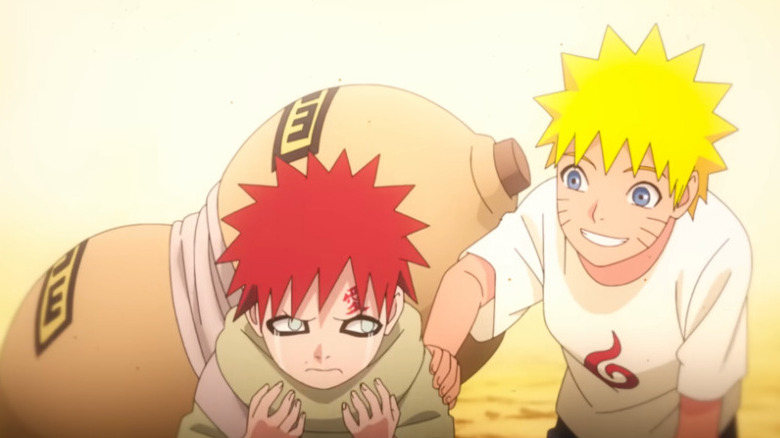The Moving Way Masashi Kishimoto Was Influenced In Writing Naruto
"Naruto" is regarded by many fans as a juggernaut within the Shonen genre. Series creator Masashi Kishimoto crafted a one-of-a-kind manga full of intense fight scenes, wacky comedy, and extraordinary character designs. After all, it takes a lot of guts and artistic vision to make the color orange work for a ninja. "Naruto" could have coasted on the reliance on action set pieces and original style. Fortunately, thanks to Kishimoto's writing, his exploration of thought-provoking concepts and philosophies provided the series with substance.
In the beginning, "Naruto" is a series that examines the strength of relationships we forge — focusing on the titular hero (Maile Flanagan) and his rival, Sasuke (Noriaki Sugiyama). Before long, the series vastly expands its focus — the effects of continuing or breaking destructive cycles, war's negative impact, and the vital link between parents and their children. Implementing heavy ideas into a genre usually intended for young kids suggested that Kishimoto may have experienced a significant change in his life while making his popular series. According to the "Naruto" creator, that's what happened.
Becoming a parent impacted his storytelling
In episode 168 of "Shippuden," Naruto finally meets his father, Minato (Toshiyuki Morikawa), in his subconscious. With a long-awaited punch and plenty of tears, the father-son reunion is probably one of the series' most raw, honest, and emotional moments. This scene allows Minato to say one of his most important lines in the series. With his son questioning himself, he tells Naruto he has faith in him. "To be a parent is to have undying faith in one's child," Minato adds. It's a scene that only could have occurred because of Masashi Kishimoto's personal life.
In an interview with Viz, Kishimoto noted that while working in the manga industry, he got married and became a parent: This led him to take stock of what was important to him. He added that his perspective vastly changed compared to when he was single, directly impacting the story of "Naruto." Without this change in Kishimoto's life, it's doubtful we would have had such notable moments as the one we see in episode 168. "Since I became a parent, I truly believe (although there might be a few exceptions) that parents all over the world always love their kids," Kishimoto shared. "When children can truly understand the love from their parents, it greatly helps them find themselves. So I really wanted to give Naruto that experience."
Kishimoto's tragic childhood friends also influenced his characters
In "Naruto," there's a noticeable focus on orphaned children dealing with loneliness. Naruto starts the series without knowing his parents, and the village unjustly hates him. (That's only the tip of the iceberg!) Naruto encounters many allies and adversaries in a similar predicament throughout his adventures. With the series' shinobi world historically embroiled in various conflicts, the story reason for many of these tragic characters is due to the horrors of war. However, some of Kishimoto's childhood friends played a part in influencing the series' characters.
In a translated Kana interview, Kishimoto revealed that the pain of some of his childhood friends stuck with him while creating "Naruto. "I had the chance to grow up in a happy family with my parents," Kishimoto said. "But I had the opportunity to watch closely what loneliness can do to a person, with a few of my old friends being orphans. There was this friend who was older than me, and I got along with him pretty well. As time went on and we grew closer, I could see his frustration [with] being an orphan."
One of the best characters presenting this type of influence in "Naruto" is Gaara (Akira Ishida). In the series, his mother dies during childbirth, his uncle tries to kill him, and his father only sees him as a weapon. Gaara eventually changes for the better, but his particular loneliness first puts him on a cruel and sadistic trek.


